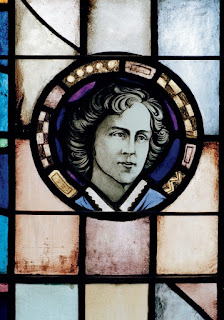Roxbury-born Poet and Essayist Louise Imogen Guiney (1861-1920)
Her father, General Patrick Guiney of the Massachusetts Irish Ninth Regiment, was a war hero in the American Civil War. As a child, Louise traveled with her mother to Virginia, where her father was stationed. General Guiney was wounded in battle and lost an eye, and in 1877 collapsed on the streets of Boston and died, greatly affecting his wife and daughter, who was just 16.
She was a pupil at the Notre Dame Academy, the Everett Grammar School, and the Convent of the Sacred Heart in Providence, RI. At age 20, Guiney began publishing poems in the Boston Pilot when John Boyle O'Reilly was editor. Initially she published under the initials P.O.L. with references to Latin, Greek and Medieval poetry, and readers assumed she was ‘a bright Harvard boy.’ By year's end she was publishing under her full name, and she later published in Atlantic Magazine and various literary journals.
By age 22 she had published her first book of poems, Songs at the Start (1883), followed by Goose-Quill Papers and The White Sail. Her final work was entitled Happy Endings.
Her father's death had left her and her mother "more glory than dollars," and throughout her life Guiney struggled to find work while pursuing her poetry and writing. In 1894, President Grover Cleveland appointed her as the Postmaster in Auburndale, just outside of Boston, and her appointment prompted protests by nativists who were anti-immigrant and anti-Catholic. In response to this treatment, people from around the country began ordering stamps from her Post Office, effectively silencing the critics. She held the post until 1897.
She got a job cataloguing at the Boston Public Library in Copley Square, where she worked for two full years in 1899 and 1900. "On her application, Guiney made no mention of 12 books published and her long list of scholarly essays," according to encyclopedia.com. "Know something of typewriting and a couple of foreign languages. Can read proof expertly," she wrote.
Guiney eventually moved to England, where she was a popular speaker and spent her final years there, doing research and writing poems and essays. In 1904, she published a monograph on Irish patriot Robert Emmet: A Survey of His Rebellion and Romance. Guiney died in England on November 2, 1920.
The Boston Public Library has a collection of Louise Guiney's letters and books.
The Burns Library at Boston College has a collection of Louise I. Guiney papers. In 2020, Boston College opened an exhibit called, Devoted Catholic and Determined Writer: Louise Imogen Guiney. Guiney is one of just two women authors represented in stained glass windows at BC's Bapst Library.
Read about other Boston Irish women on IrishMassachusetts blog.





Comments
Post a Comment